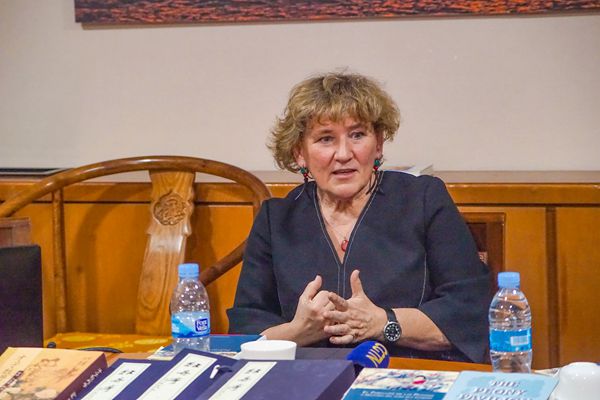
Alicia Relinque. (Photo: Chinaculture.org)
A gathering of China Enter Lineas was held at the Chinese Cultural Center in Madrid. Members of China Enter Lineas, a reading club of the Chinese Cultural Center of Madrid, discussed the Chinese literary classic, The Peony Pavilion, with Spanish sinologist and translator Alicia Relinque, on Thursday.
The Peony Pavilion, is a play by Tang Xianzu (1550-1661), a Ming Dynasty (1368-1644) dramatist. It tells the story of a dignitary named Du Liniang who loves Liu Mengmei. In a dream, she falls for a scholar and dies of grief. She turns herself into a soul to find Liu, and comes back to life. She finally reunites with Liu Mengmei forever.
Relinque led the reader to review the outline and background of The Peony Pavilion, and explained the breakthroughs in the thought and art of this legendary work.
"In the early Ming Dynasty, Neo-Confucianism was promoted to the supreme position in order to strengthen the autocracy of the monarch. Human nature urgently needed to express itself under such high pressure. The Peony Pavilion just reflected the author's liberation of personality. In addition, its exquisite and elegant diction, characterization and imagination are amazing," Relinque said.
The Spanish edition of the play was published by the Chinese Culture Center in Madrid in 2016 and was translated by Relinque, who is the foreign dean of the Confucius Institute of Granada University. She has devoted herself to the research and translation of classical Chinese literature. Her academic achievements and translated works are of great significance to the study of Chinese literature in Spanish-speaking regions and countries. She won the 11th Special Book Award of China.
The China Enter Lineas Reading Club of the Chinese Culture Center in Madrid was officially established in June. Its goal is to enable more Spanish readers to approach the world of Chinese literature and promote deeper interaction between Chinese and Western cultures.


